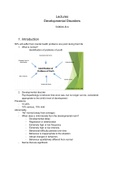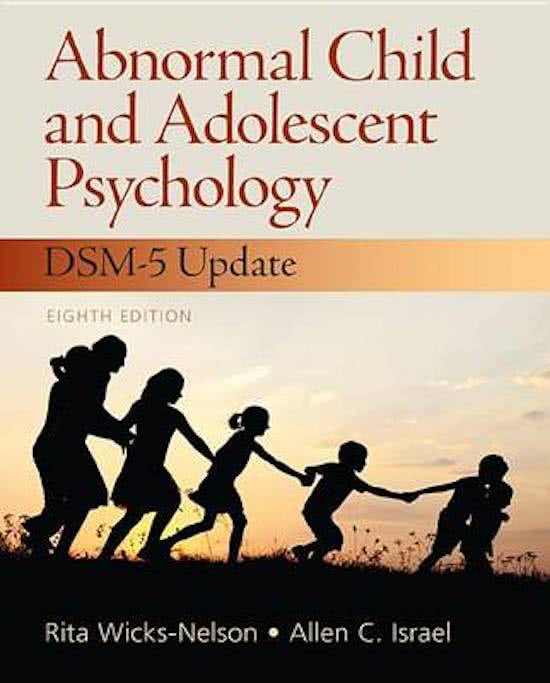Lectures
Developmental Disorders
560026-B-6
1. Introduction
50% will suffer from mental health problems one point during their life
1. What is normal?
Identification of problems of youth
2. Developmental disorder
Psychopathology is behavior that once was, but no longer can be, considered
appropriate to the child’s level of development.
Prevalence
- 15-20%
- 10% serious, 10% mild
Abnormality
- “Ab”-normal (away from average)
- When does a child deviate from the developmental norm?
- Developmental delay
- Regression or deterioration
- Extremely high or low frequency
- Extremely high or low intensity
- Behavioral difficulty persists over time
- Behaviour is inappropriate to the situation
- Abrupt changes in behaviors
- Behaviour qualitatively different from normal
- Norma that are significant:
, - Culture/ethnicity
- Gender (male: externalizing/more disorders; female: internalizing, eating
disorder)
- Age (autism → ADHD → learning problem → conduct disorder → drug
abuse/eating disorder/schizophrenia
- Lifestyle changes (focus on body size, more drug abuse)
- Developmental Psychopathology
The study of developmental process that contribute to, or protect against,
psychopathology
- Etiology and pathophysiology are still unknown
- Therapeutic interventions are only partially effective, are mainly symptomatic and often
do not bring complete cure
- A large number and wide diversity of treatments for children currently exist, many
of which are expensive, intrusive and NOT supported by scientific data
3. General developmental framework
Five contexts (micro-macro)
- Biological
- Individual
- Family
- Social
- Culture
Ecological & transactional models (Bronfenbrenner/Sameroff)
- Micro, meso and macro systems
Highest level = societal and political level
Transactional because it should also influence the time, back and forth exchange of information
but also interaction changes through time and changes the context (chronosystem: the changes
which occur over time - lifespan development) Developmental framework.
4. Models of child psychopathology
Medical
- Psychopathology result from organic dysfunction
- Problems are individual
- Classifying psychopathological behaviours → diagnosis
- ICD10
,Behavioral
- Observed behaviors / empirical & experimental paradigm
- Learning principles
- Classic/respondent conditioning (Watson) → dog hears a bell stars salivation
- Operant conditioning (Skinner) → science is the willingness to accept facts, even
when they are opposed to wishes (reinforcement, extinction, punishment,
generalization, discrimination, shaping, avoidance learning)
- Imitation
- Social Learning: a wrong role model, someone you identify with → introducing
cognitive processes
- Behavioral perspective on psychopathology
- Behavior as result of these learning principles
- Excess or deficit in frequency and intensity (compared to cultural and
developmental norms)
Cognitive
- Piaget
- Fixed order of stages
- Schema
- Assimilation/accommodation
- Accomodation, changing our scheme and recognizing that the two have
the same amount inside (according to their shape)
Psychoanalytic
- Classic psychoanalysis (Freud
- Structural model (id, ego, superego)
- Psychosexual stages (fixations, regression)
- Ego Psychology (Erikson) → reality oriented/adaptive
- Object relation theory (Bowlby & Mahler) → the decisive first
relationship we have is usually the mother determines how we
develop throughout life
- Attachment (Ainsworth) → secure and insecure attachment
(avoidant/resistant/disorganized) → emotional reactivity and
regulation is crucial for (mal)adaptive development
- Critiqued:
- Complex theory
- Many assumptions were difficult to test
- Based on clinical observations, not objective date
, - Yet, influential in generating new research questions
-
Family systems
- Family as a developing system: dynamic system is more than the sum of its parts
- Structural family system theory (Minuchin, 1912)
- Family consists of subsystems
- Parent/child
- Brothers/sisters
- Parents as couple
- Psychopathology is located in the relational structures of family life (rigid or without
limits) and/or ‘triangulation’ of the child in parental subsystem
(symbiosis: eco borders are not defined)
5. Developmental psychopathology
- Contemporary view
- The study of developmental processes that contribute to, or protect against,
psychopathology (important to have empirical bases for htat)
- Macro: developmental psychopathology = framework
- Micro Paradigms: biological, behavioral, psychoanalytic, cognitive, system






